人教版(2019)选择性必修 第二册Unit 2 Bridging Cultures单元知识清单讲义
文档属性
| 名称 | 人教版(2019)选择性必修 第二册Unit 2 Bridging Cultures单元知识清单讲义 |
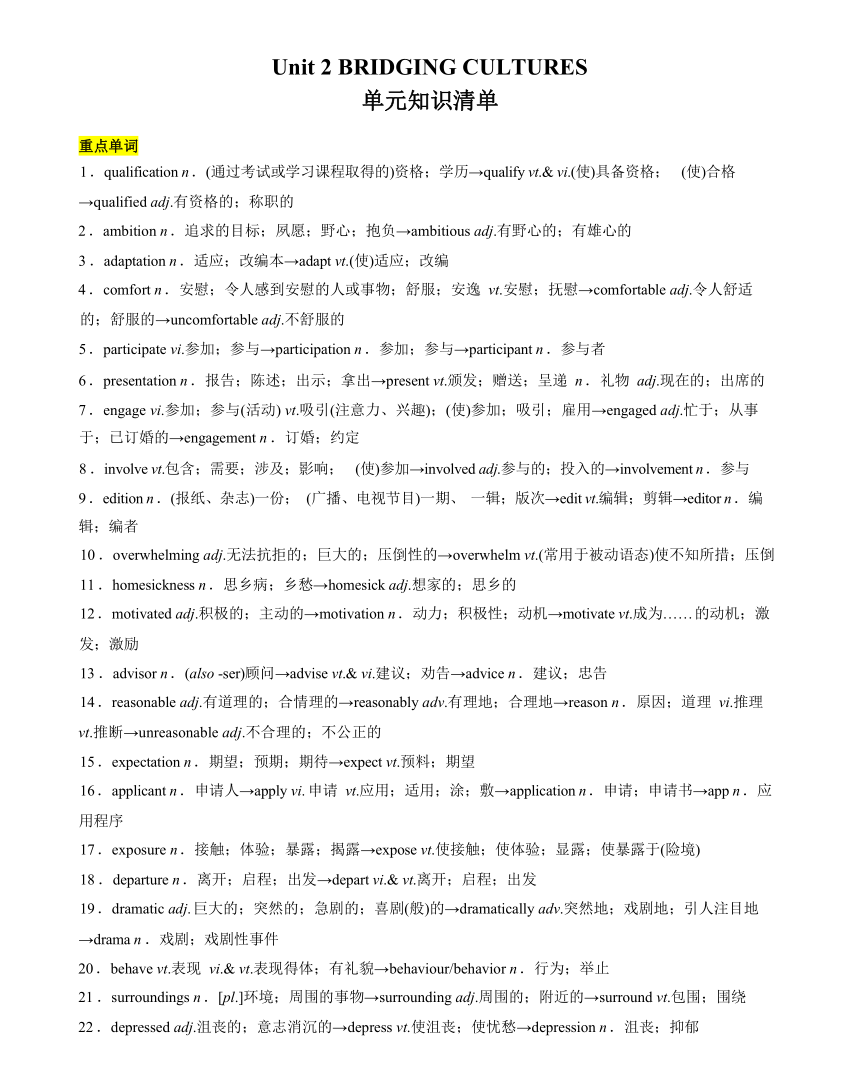
|
|
| 格式 | docx | ||
| 文件大小 | 44.9KB | ||
| 资源类型 | 教案 | ||
| 版本资源 | 人教版(2019) | ||
| 科目 | 英语 | ||
| 更新时间 | 2024-04-24 00:00:00 | ||
图片预览

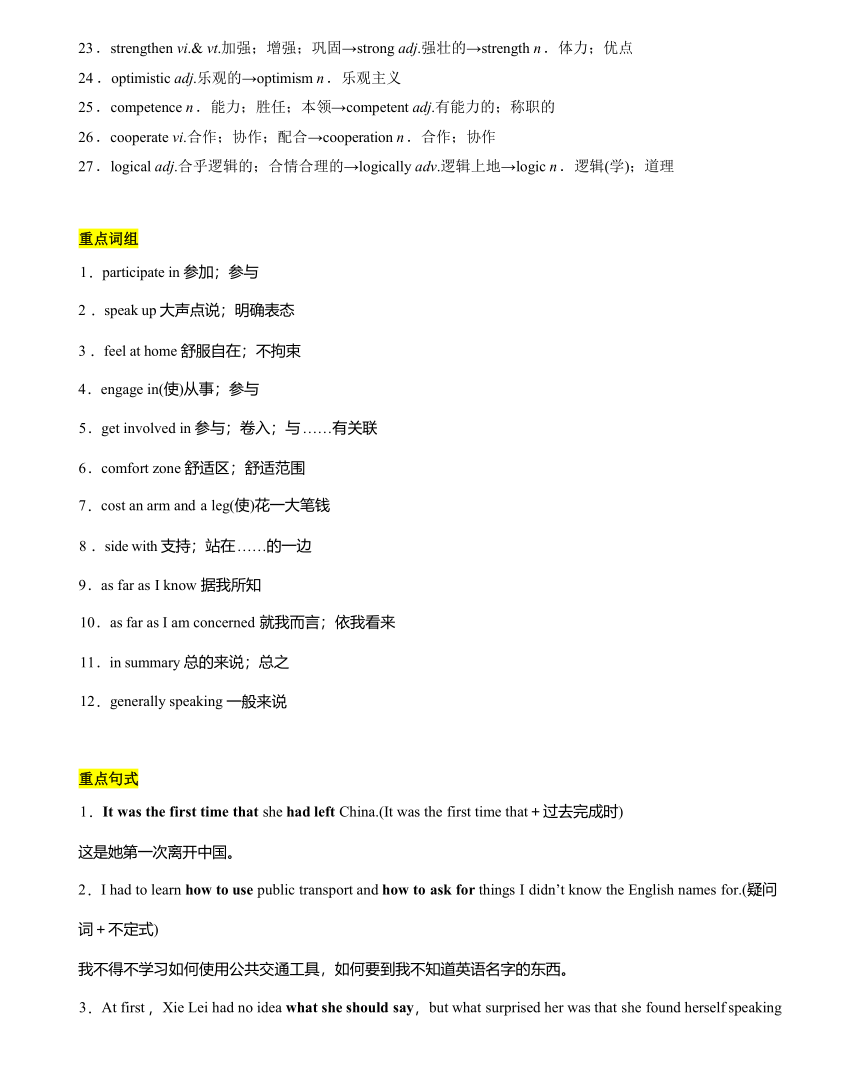
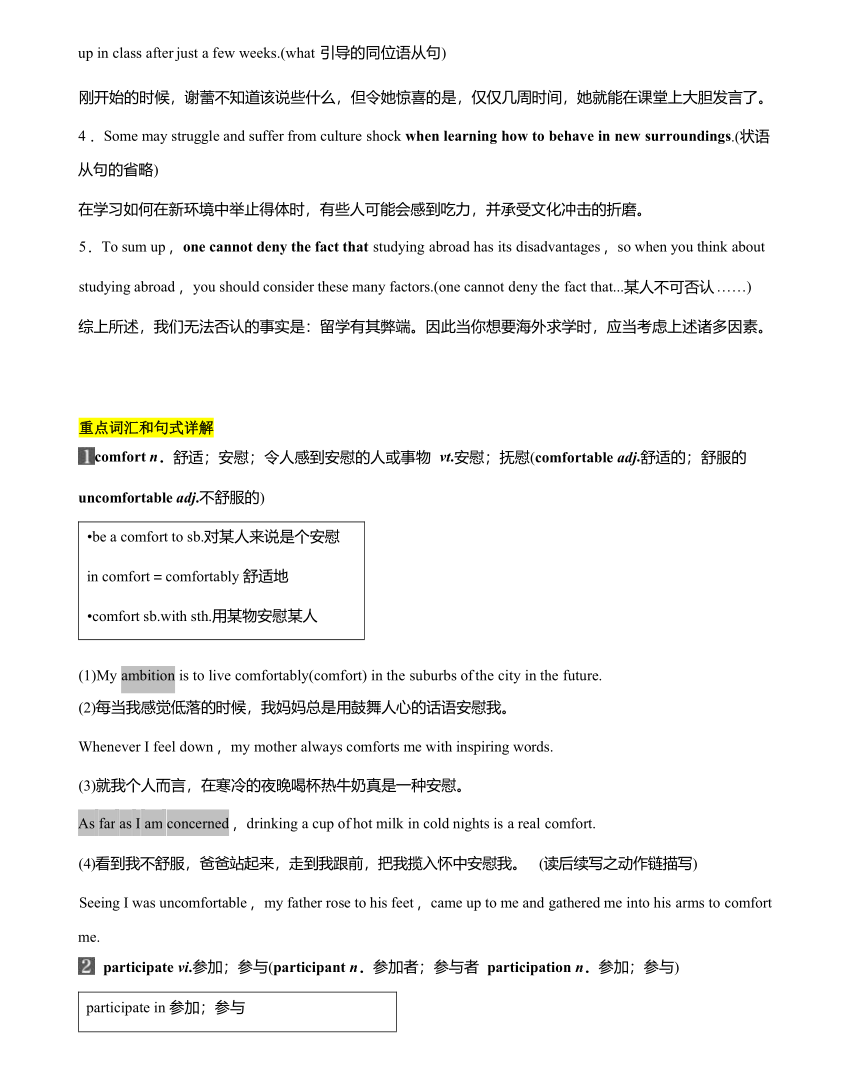
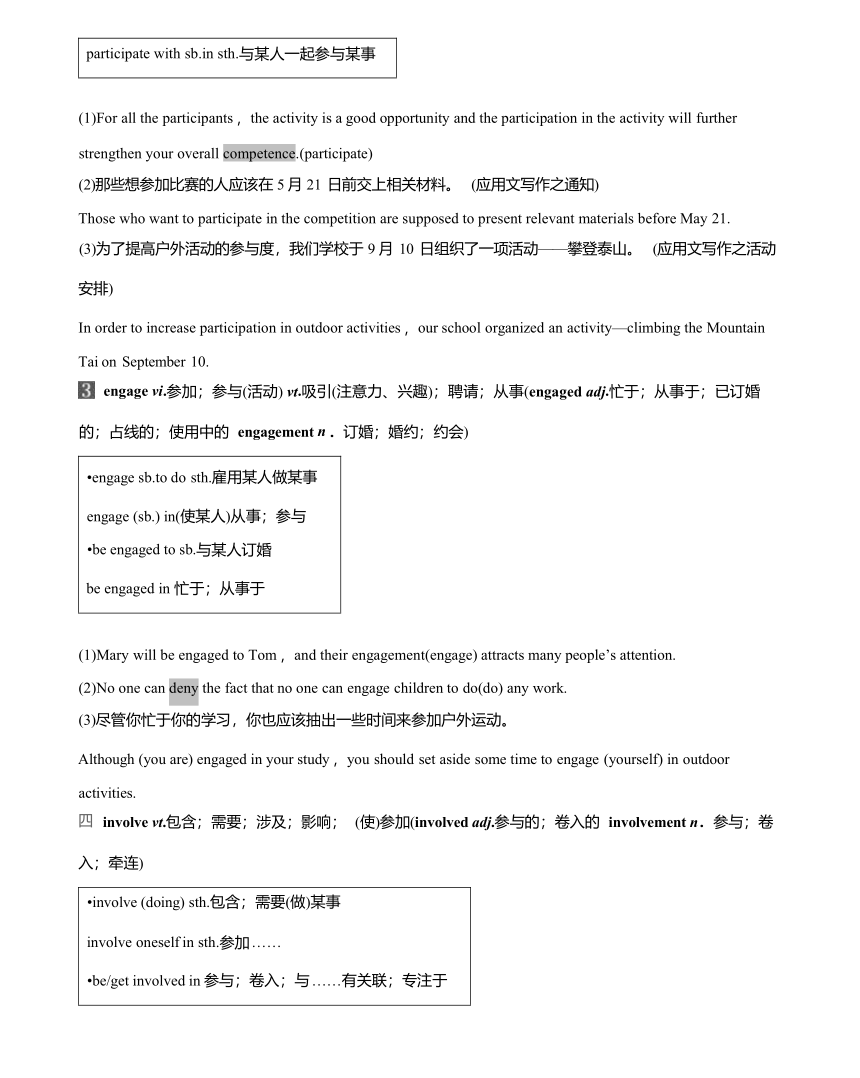
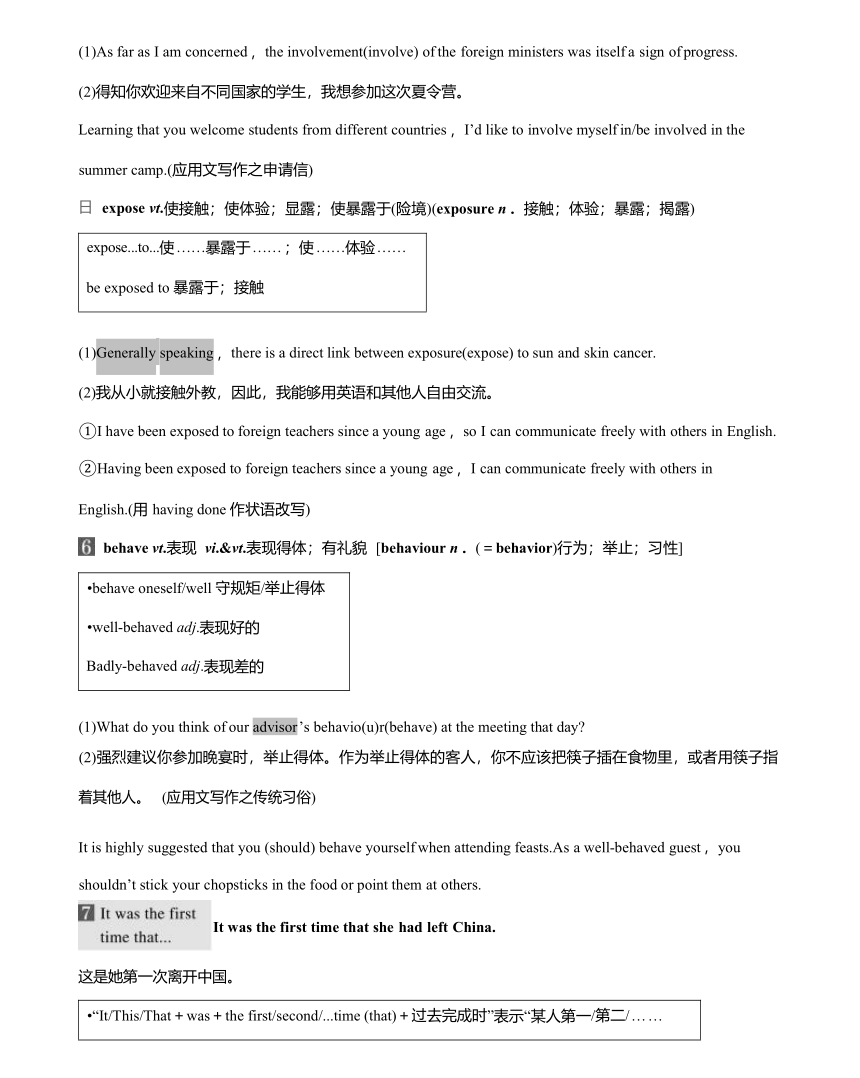
文档简介
Unit 2 BRIDGING CULTURES 单元知识清单
重点单词
1 .qualification n .(通过考试或学习课程取得的)资格;学历→qualify vt.& vi.(使)具备资格; (使)合格
→qualified adj.有资格的;称职的
2 .ambition n .追求的目标;夙愿;野心;抱负→ambitious adj.有野心的;有雄心的
3 .adaptation n .适应;改编本→adapt vt.(使)适应;改编
4 .comfort n .安慰;令人感到安慰的人或事物;舒服;安逸 vt.安慰;抚慰→comfortable adj.令人舒适
的;舒服的→uncomfortable adj.不舒服的
5 .participate vi.参加;参与→participation n .参加;参与→participant n .参与者
6 .presentation n .报告;陈述;出示;拿出→present vt.颁发;赠送;呈递 n .礼物 adj.现在的;出席的 7 .engage vi.参加;参与(活动) vt.吸引(注意力、兴趣);(使)参加;吸引;雇用→engaged adj.忙于;从事
于;已订婚的→engagement n .订婚;约定
8 .involve vt.包含;需要;涉及;影响; (使)参加→involved adj.参与的;投入的→involvement n .参与 9 .edition n .(报纸、杂志)一份; (广播、电视节目)一期、 一辑;版次→edit vt.编辑;剪辑→editor n .编
辑;编者
10 .overwhelming adj.无法抗拒的;巨大的;压倒性的→overwhelm vt.(常用于被动语态)使不知所措;压倒
11 .homesickness n .思乡病;乡愁→homesick adj.想家的;思乡的
12 .motivated adj.积极的;主动的→motivation n .动力;积极性;动机→motivate vt.成为…… 的动机;激
发;激励
13 .advisor n .(also -ser)顾问→advise vt.& vi.建议;劝告→advice n .建议;忠告
14 .reasonable adj.有道理的;合情理的→reasonably adv.有理地;合理地→reason n .原因;道理 vi.推理
vt.推断→unreasonable adj.不合理的;不公正的
15 .expectation n .期望;预期;期待→expect vt.预料;期望
16 .applicant n .申请人→apply vi. 申请 vt.应用;适用;涂;敷→application n .申请;申请书→app n .应
用程序
17 .exposure n .接触;体验;暴露;揭露→expose vt.使接触;使体验;显露;使暴露于(险境)
18 .departure n .离开;启程;出发→depart vi.& vt.离开;启程;出发
19 .dramatic adj. 巨大的;突然的;急剧的;喜剧(般)的→dramatically adv.突然地;戏剧地;引人注目地
→drama n .戏剧;戏剧性事件
20 .behave vt.表现 vi.& vt.表现得体;有礼貌→behaviour/behavior n .行为;举止
21 .surroundings n .[pl.]环境;周围的事物→surrounding adj.周围的;附近的→surround vt.包围;围绕
22 .depressed adj.沮丧的;意志消沉的→depress vt.使沮丧;使忧愁→depression n .沮丧;抑郁
23 .strengthen vi.& vt.加强;增强;巩固→strong adj.强壮的→strength n .体力;优点
24 .optimistic adj.乐观的→optimism n .乐观主义
25 .competence n .能力;胜任;本领→competent adj.有能力的;称职的
26 .cooperate vi.合作;协作;配合→cooperation n .合作;协作
27 .logical adj.合乎逻辑的;合情合理的→logically adv.逻辑上地→logic n .逻辑(学);道理
重点词组
1.participate in 参加;参与
2 .speak up 大声点说;明确表态
3 .feel at home 舒服自在;不拘束
4.engage in(使)从事;参与
5.get involved in 参与;卷入;与 ……有关联
6.comfort zone 舒适区;舒适范围
7.cost an arm and a leg(使)花一大笔钱
8 .side with 支持;站在 ……的一边
9.as far as I know 据我所知
10.as far as I am concerned 就我而言;依我看来
11.in summary 总的来说;总之
12.generally speaking 一般来说
重点句式
1.It was the first time that she had left China.(It was the first time that+过去完成时)
这是她第一次离开中国。
2.I had to learn how to use public transport and how to ask for things I didn’t know the English names for.(疑问
词+不定式)
我不得不学习如何使用公共交通工具,如何要到我不知道英语名字的东西。
3.At first ,Xie Lei had no idea what she should say,but what surprised her was that she found herself speaking
up in class after just a few weeks.(what 引导的同位语从句)
刚开始的时候,谢蕾不知道该说些什么,但令她惊喜的是,仅仅几周时间,她就能在课堂上大胆发言了。 4 .Some may struggle and suffer from culture shock when learning how to behave in new surroundings.(状语
从句的省略)
在学习如何在新环境中举止得体时,有些人可能会感到吃力,并承受文化冲击的折磨。
5.To sum up ,one cannot deny the fact that studying abroad has its disadvantages ,so when you think about
studying abroad ,you should consider these many factors.(one cannot deny the fact that...某人不可否认 ……)
综上所述,我们无法否认的事实是:留学有其弊端。因此当你想要海外求学时,应当考虑上述诸多因素。
重点词汇和句式详解
comfort n.舒适;安慰;令人感到安慰的人或事物 vt.安慰;抚慰(comfortable adj.舒适的;舒服的
uncomfortable adj.不舒服的)
be a comfort to sb.对某人来说是个安慰 in comfort=comfortably 舒适地 comfort sb.with sth.用某物安慰某人
(1)My ambition is to live comfortably(comfort) in the suburbs of the city in the future.
(2)每当我感觉低落的时候,我妈妈总是用鼓舞人心的话语安慰我。
Whenever I feel down ,my mother always comforts me with inspiring words.
(3)就我个人而言,在寒冷的夜晚喝杯热牛奶真是一种安慰。
AsfarasIamconcerned ,drinking a cup of hot milk in cold nights is a real comfort.
(4)看到我不舒服,爸爸站起来,走到我跟前,把我揽入怀中安慰我。 (读后续写之动作链描写)
Seeing I was uncomfortable ,my father rose to his feet ,came up to me and gathered me into his arms to comfort
me.
participate vi.参加;参与(participant n.参加者;参与者 participation n.参加;参与)
participate in 参加;参与
participate with sb.in sth.与某人一起参与某事
(1)For all the participants ,the activity is a good opportunity and the participation in the activity will further
strengthen your overall competence.(participate)
(2)那些想参加比赛的人应该在 5 月 21 日前交上相关材料。 (应用文写作之通知)
Those who want to participate in the competition are supposed to present relevant materials before May 21.
(3)为了提高户外活动的参与度,我们学校于 9 月 10 日组织了一项活动——攀登泰山。 (应用文写作之活动
安排)
In order to increase participation in outdoor activities ,our school organized an activity—climbing the Mountain
Tai on September 10.
engage vi.参加;参与(活动) vt.吸引(注意力、兴趣);聘请;从事(engaged adj.忙于;从事于;已订婚
的;占线的;使用中的 engagement n .订婚;婚约;约会)
engage sb.to do sth.雇用某人做某事 engage (sb.) in(使某人)从事;参与 be engaged to sb.与某人订婚 be engaged in 忙于;从事于
(1)Mary will be engaged to Tom ,and their engagement(engage) attracts many people’s attention.
(2)No one can deny the fact that no one can engage children to do(do) any work.
(3)尽管你忙于你的学习,你也应该抽出一些时间来参加户外运动。
Although (you are) engaged in your study ,you should set aside some time to engage (yourself) in outdoor
activities.
四 involve vt.包含;需要;涉及;影响; (使)参加(involved adj.参与的;卷入的 involvement n.参与;卷
入;牵连)
involve (doing) sth.包含;需要(做)某事 involve oneself in sth.参加 …… be/get involved in 参与;卷入;与 ……有关联;专注于
(1)As far as I am concerned ,the involvement(involve) of the foreign ministers was itself a sign of progress.
(2)得知你欢迎来自不同国家的学生,我想参加这次夏令营。
Learning that you welcome students from different countries ,I’d like to involve myself in/be involved in the
summer camp.(应用文写作之申请信)
日 expose vt.使接触;使体验;显露;使暴露于(险境)(exposure n .接触;体验;暴露;揭露)
expose...to...使 ……暴露于 …… ;使 ……体验 …… be exposed to 暴露于;接触
(1)Generallyspeaking ,there is a direct link between exposure(expose) to sun and skin cancer.
(2)我从小就接触外教,因此,我能够用英语和其他人自由交流。
①I have been exposed to foreign teachers since a young age ,so I can communicate freely with others in English.
②Having been exposed to foreign teachers since a young age ,I can communicate freely with others in
English.(用 having done 作状语改写)
behave vt.表现 vi.&vt.表现得体;有礼貌 [behaviour n .(=behavior)行为;举止;习性]
behave oneself/well 守规矩/举止得体 well-behaved adj.表现好的 Badly-behaved adj.表现差的
(1)What do you think of our advisor ’s behavio(u)r(behave) at the meeting that day
(2)强烈建议你参加晚宴时,举止得体。作为举止得体的客人,你不应该把筷子插在食物里,或者用筷子指
着其他人。 (应用文写作之传统习俗)
It is highly suggested that you (should) behave yourself when attending feasts.As a well-behaved guest ,you
shouldn’t stick your chopsticks in the food or point them at others.
It was the first time that she had left China.
这是她第一次离开中国。
“It/This/That+was+the first/second/...time (that)+过去完成时”表示“某人第一/第二/ … …
次……” “It/This/That+is+the first/second/...time (that)+现在完成时”表示“某人第一/第二/ … … 次……” It is/was (about/high) time that...should do sth./did sth.意为“到了 ……做某事的时间了” ,should 不能省略。相当于 It is/was time for sb.to do sth.。
(1)This is the second time that the teaching assistant has been blamed(blame) by our headmaster.
(2)这是双胞胎第一次为母亲做早餐,因此他们既激动又紧张。
This was the first time that the twins had prepared a breakfast for their mother ,so they were excited and nervous.
(3)到了政府应该采取措施保护野生动物免遭灭绝的时候了。
①It is high time for the government to take effective measures to protect wildlife from extinction.(It is high time
for...to do)
②It is high time that the government should take/took effective measures to protect wildlife from extinction.(It is
high time that...)
I had to learn how to use public transport and how to ask for things I didn’t know the
English names for.我不得不学习如何使用公共交通工具,如何要到我不知道英语名字的东西。
“疑问词+不定式”结构可在句中作主语、宾语、表语、宾语补足语等句子成分。 在“疑问词+不定式”结构中,不定式必须用主动式而不能用被动式。 why 或 why not后加不定式时,省略不定式符号 to。 whether 后可接不定式,而 if 后不可以。
(1)由于他们流露出极强的兴趣,我开始教他们如何泡中国茶。
With their interest greatly sparked ,I began to teach them how to make Chinese tea.
(2)如果你能给我们一些如何改进机器人的建议,我会感激不尽的。 (应用文写作之征求建议)
I would appreciate it if you could give us some advice on how to improve our robots.
(3)我真不知道是否该接受她的邀请。
I really have no idea whether to accept her invitation or not.
(4)为何不参加讨论小组,以便你能找到志同道合的朋友呢? (应用文写作之建议信)
Why not join in discussion groups so that you can find friends with similar interests
Some may struggle and suffer from culture shock when learning how to behave in new
surroundings.
在学习如何在新环境中举止得体时,有些人可能会感到吃力,并承受文化冲击的折磨。
状语从句的省略有两种形式: 当状语从句的主语和主句的主语一致,且从句中含有 be 动词时,可将从句的主语和 be 动 词一起省略。 当从句中含有“it+be 动词”时,可将 it 和 be 动词省略。
(1)If I am accepted ,I will introduce Chinese painting skills to visitors ,which can help them know more about
Chinese culture.(应用文写作之传统文化)
→If accepted ,I will introduce Chinese painting skills to visitors ,which can help them know more about Chinese
culture.
(2)If it is possible ,I am going to visit some homes of the old in the city.
→If possible ,I am going to visit some homes of the old in the city.
(3)工作的时候,我意识到在烈日下在田间工作是多么地辛苦。
When working ,I realized how hard it was to work in the fields under a hot sun.
重点语法详解
名词性从句
名词性从句相当于名词,可分别作主句的主语、表语、宾语和同位语。因此,名词性从句可分为主语从句、
表语从句、宾语从句和同位从句。
(一) 引导名词性从句的连接词
1. 连接代词:who , whose , whom , what , which。有词义,在从句中担任成分,如主语、表语、
宾语、或定语等。
2. 连接副词: when , where , why , how。有词义,在从句中担任成分,作状语。
3. 连接词: that , whether , if, as if。that 无词义,在从句中不担任成分,有时可省略; if (whether),
as if 虽有词义,但在从句中不担任成分。
注意:连接代词与连接副词在句中不再是疑问句,因而从句中谓语不用疑问式。连接代词与连接副词 在从句充当句子成分, 连接词 whether 和 if(是否),as if(好象)在从句中不充当句子成分, 只起连接作用。根 据句义, 如果连接代词与连接副词, whether 、if 和as if 都用不上时, 才用 that 作连接词(that 本身无任何含
义)。
(二)主语从句
1 、主语从句在复合句作主语。
Who will go is not important.
2、用 it 作形式主语,主语从句放在句末。
It doesn't matter so much whether you will come or not.
3 、that 引导主语从句时,不作成分,不能省略。
That he suddenly fell ill last week made us surprised.
4. 用 it 作形式主语的常用句型
① It + be + 及物动词的过去分词+从句
It is said that… 据说……
It is reported that… 据报道……
It is believed that… 人们相信……
② It + be+名词+从句
It is a fact that… 事实是……
It is good news that… ……是个好消息
③ It +be+形容词+从句
It is necessary that… 有必要……
It is important that… 重要的是……
④ It seems/appears/happens/… +主语从句
(三)表语从句
1 、表语从句在复合句中作表语,位于系动词之后。
The question was who could go there.
2、表语从句的引导词与主语从句和宾语从句的引导词基本相同,但是 if 不能引导表语从句。
3、连接词 that, whether 引导表语从句,连接词一般不能省略。
The question is whether we should recommend the goods to the shopkeeper.
4、连接副词 when,where, why, how 引导表语从句,连接词在从句中作状语、表语。
That was how Peter got his bachelor's degree.
5、连接代词 what, which, who, whom, whose 引导表语从句, 连接词在从句中可作主语、表语、宾语或
定语。
That's what we want to purchase.
6、有时 because, as if, as though 也可以引导表语从句。
It looks as if you have made full preparations for the final exam.
(四)宾语从句
1、宾语从句在复合句中作宾语。引导宾语从句的连词 that 一般可省略。
I hope (that) everything is all right.
2、介词之后的宾语从句,不可用 which 或 if 连接,要分别用 what 或 whether。
I'm interested in whether you've finished the work..
I'm interested in what you've said.
3 、whether 与 if 都可以引导宾语从句,常可互换。但下面情况不能互换。
①宾语从句是否定句时,只用 if,不用 whether。
I wonder if it doesn't rain.
②用 if 会引起误解,就要用 whether。
Please let me know whether you want to go.(此句如果把 whether 改成 if,容易当成条件句理解)
③宾语从句中的 whether 与 or not 直接连用,就不能换成 if;不直接连用,可换。
I don't know whether or not the report is true.
I don't know whether/ if the report is true or not.
④介词后的宾语从句要用 whether 引导。whether 可与不定式连用。whether 也可引导主语从句、表语 从句、同位语从句, 还可引导让步状语从句, 以上均不能换成 if。但引导条件从句时, 只能用 if,而不能用
whether。
It depends on whether we have enough time.
They don't know whether to go there.
Please come to see me if you have time.
4、连接副词 when,where, why, how 引导宾语从句,连接词在从句中作状语。
We haven't decided when we'll go hiking.
我们还未决定何时去远足。
5、连接代词 what, which, who, whom, whose 引导宾语从句时, 在从句中起代词的作用, 可在从句中作
主语、宾语、表语或定语。
I don't know who will accompany you to the concert tonight.
我不知道今晚谁将陪你去音乐会。
(五)同位语从句
同位语从句在句中作某一名词的同位语,一般位于该名词(如:news , fact , idea , suggestion,
promise 等)之后,说明该名词的具体内容。
I have no idea when he will be back.
The fact that he had not said anything surprised everybody.
重点单词
1 .qualification n .(通过考试或学习课程取得的)资格;学历→qualify vt.& vi.(使)具备资格; (使)合格
→qualified adj.有资格的;称职的
2 .ambition n .追求的目标;夙愿;野心;抱负→ambitious adj.有野心的;有雄心的
3 .adaptation n .适应;改编本→adapt vt.(使)适应;改编
4 .comfort n .安慰;令人感到安慰的人或事物;舒服;安逸 vt.安慰;抚慰→comfortable adj.令人舒适
的;舒服的→uncomfortable adj.不舒服的
5 .participate vi.参加;参与→participation n .参加;参与→participant n .参与者
6 .presentation n .报告;陈述;出示;拿出→present vt.颁发;赠送;呈递 n .礼物 adj.现在的;出席的 7 .engage vi.参加;参与(活动) vt.吸引(注意力、兴趣);(使)参加;吸引;雇用→engaged adj.忙于;从事
于;已订婚的→engagement n .订婚;约定
8 .involve vt.包含;需要;涉及;影响; (使)参加→involved adj.参与的;投入的→involvement n .参与 9 .edition n .(报纸、杂志)一份; (广播、电视节目)一期、 一辑;版次→edit vt.编辑;剪辑→editor n .编
辑;编者
10 .overwhelming adj.无法抗拒的;巨大的;压倒性的→overwhelm vt.(常用于被动语态)使不知所措;压倒
11 .homesickness n .思乡病;乡愁→homesick adj.想家的;思乡的
12 .motivated adj.积极的;主动的→motivation n .动力;积极性;动机→motivate vt.成为…… 的动机;激
发;激励
13 .advisor n .(also -ser)顾问→advise vt.& vi.建议;劝告→advice n .建议;忠告
14 .reasonable adj.有道理的;合情理的→reasonably adv.有理地;合理地→reason n .原因;道理 vi.推理
vt.推断→unreasonable adj.不合理的;不公正的
15 .expectation n .期望;预期;期待→expect vt.预料;期望
16 .applicant n .申请人→apply vi. 申请 vt.应用;适用;涂;敷→application n .申请;申请书→app n .应
用程序
17 .exposure n .接触;体验;暴露;揭露→expose vt.使接触;使体验;显露;使暴露于(险境)
18 .departure n .离开;启程;出发→depart vi.& vt.离开;启程;出发
19 .dramatic adj. 巨大的;突然的;急剧的;喜剧(般)的→dramatically adv.突然地;戏剧地;引人注目地
→drama n .戏剧;戏剧性事件
20 .behave vt.表现 vi.& vt.表现得体;有礼貌→behaviour/behavior n .行为;举止
21 .surroundings n .[pl.]环境;周围的事物→surrounding adj.周围的;附近的→surround vt.包围;围绕
22 .depressed adj.沮丧的;意志消沉的→depress vt.使沮丧;使忧愁→depression n .沮丧;抑郁
23 .strengthen vi.& vt.加强;增强;巩固→strong adj.强壮的→strength n .体力;优点
24 .optimistic adj.乐观的→optimism n .乐观主义
25 .competence n .能力;胜任;本领→competent adj.有能力的;称职的
26 .cooperate vi.合作;协作;配合→cooperation n .合作;协作
27 .logical adj.合乎逻辑的;合情合理的→logically adv.逻辑上地→logic n .逻辑(学);道理
重点词组
1.participate in 参加;参与
2 .speak up 大声点说;明确表态
3 .feel at home 舒服自在;不拘束
4.engage in(使)从事;参与
5.get involved in 参与;卷入;与 ……有关联
6.comfort zone 舒适区;舒适范围
7.cost an arm and a leg(使)花一大笔钱
8 .side with 支持;站在 ……的一边
9.as far as I know 据我所知
10.as far as I am concerned 就我而言;依我看来
11.in summary 总的来说;总之
12.generally speaking 一般来说
重点句式
1.It was the first time that she had left China.(It was the first time that+过去完成时)
这是她第一次离开中国。
2.I had to learn how to use public transport and how to ask for things I didn’t know the English names for.(疑问
词+不定式)
我不得不学习如何使用公共交通工具,如何要到我不知道英语名字的东西。
3.At first ,Xie Lei had no idea what she should say,but what surprised her was that she found herself speaking
up in class after just a few weeks.(what 引导的同位语从句)
刚开始的时候,谢蕾不知道该说些什么,但令她惊喜的是,仅仅几周时间,她就能在课堂上大胆发言了。 4 .Some may struggle and suffer from culture shock when learning how to behave in new surroundings.(状语
从句的省略)
在学习如何在新环境中举止得体时,有些人可能会感到吃力,并承受文化冲击的折磨。
5.To sum up ,one cannot deny the fact that studying abroad has its disadvantages ,so when you think about
studying abroad ,you should consider these many factors.(one cannot deny the fact that...某人不可否认 ……)
综上所述,我们无法否认的事实是:留学有其弊端。因此当你想要海外求学时,应当考虑上述诸多因素。
重点词汇和句式详解
comfort n.舒适;安慰;令人感到安慰的人或事物 vt.安慰;抚慰(comfortable adj.舒适的;舒服的
uncomfortable adj.不舒服的)
be a comfort to sb.对某人来说是个安慰 in comfort=comfortably 舒适地 comfort sb.with sth.用某物安慰某人
(1)My ambition is to live comfortably(comfort) in the suburbs of the city in the future.
(2)每当我感觉低落的时候,我妈妈总是用鼓舞人心的话语安慰我。
Whenever I feel down ,my mother always comforts me with inspiring words.
(3)就我个人而言,在寒冷的夜晚喝杯热牛奶真是一种安慰。
AsfarasIamconcerned ,drinking a cup of hot milk in cold nights is a real comfort.
(4)看到我不舒服,爸爸站起来,走到我跟前,把我揽入怀中安慰我。 (读后续写之动作链描写)
Seeing I was uncomfortable ,my father rose to his feet ,came up to me and gathered me into his arms to comfort
me.
participate vi.参加;参与(participant n.参加者;参与者 participation n.参加;参与)
participate in 参加;参与
participate with sb.in sth.与某人一起参与某事
(1)For all the participants ,the activity is a good opportunity and the participation in the activity will further
strengthen your overall competence.(participate)
(2)那些想参加比赛的人应该在 5 月 21 日前交上相关材料。 (应用文写作之通知)
Those who want to participate in the competition are supposed to present relevant materials before May 21.
(3)为了提高户外活动的参与度,我们学校于 9 月 10 日组织了一项活动——攀登泰山。 (应用文写作之活动
安排)
In order to increase participation in outdoor activities ,our school organized an activity—climbing the Mountain
Tai on September 10.
engage vi.参加;参与(活动) vt.吸引(注意力、兴趣);聘请;从事(engaged adj.忙于;从事于;已订婚
的;占线的;使用中的 engagement n .订婚;婚约;约会)
engage sb.to do sth.雇用某人做某事 engage (sb.) in(使某人)从事;参与 be engaged to sb.与某人订婚 be engaged in 忙于;从事于
(1)Mary will be engaged to Tom ,and their engagement(engage) attracts many people’s attention.
(2)No one can deny the fact that no one can engage children to do(do) any work.
(3)尽管你忙于你的学习,你也应该抽出一些时间来参加户外运动。
Although (you are) engaged in your study ,you should set aside some time to engage (yourself) in outdoor
activities.
四 involve vt.包含;需要;涉及;影响; (使)参加(involved adj.参与的;卷入的 involvement n.参与;卷
入;牵连)
involve (doing) sth.包含;需要(做)某事 involve oneself in sth.参加 …… be/get involved in 参与;卷入;与 ……有关联;专注于
(1)As far as I am concerned ,the involvement(involve) of the foreign ministers was itself a sign of progress.
(2)得知你欢迎来自不同国家的学生,我想参加这次夏令营。
Learning that you welcome students from different countries ,I’d like to involve myself in/be involved in the
summer camp.(应用文写作之申请信)
日 expose vt.使接触;使体验;显露;使暴露于(险境)(exposure n .接触;体验;暴露;揭露)
expose...to...使 ……暴露于 …… ;使 ……体验 …… be exposed to 暴露于;接触
(1)Generallyspeaking ,there is a direct link between exposure(expose) to sun and skin cancer.
(2)我从小就接触外教,因此,我能够用英语和其他人自由交流。
①I have been exposed to foreign teachers since a young age ,so I can communicate freely with others in English.
②Having been exposed to foreign teachers since a young age ,I can communicate freely with others in
English.(用 having done 作状语改写)
behave vt.表现 vi.&vt.表现得体;有礼貌 [behaviour n .(=behavior)行为;举止;习性]
behave oneself/well 守规矩/举止得体 well-behaved adj.表现好的 Badly-behaved adj.表现差的
(1)What do you think of our advisor ’s behavio(u)r(behave) at the meeting that day
(2)强烈建议你参加晚宴时,举止得体。作为举止得体的客人,你不应该把筷子插在食物里,或者用筷子指
着其他人。 (应用文写作之传统习俗)
It is highly suggested that you (should) behave yourself when attending feasts.As a well-behaved guest ,you
shouldn’t stick your chopsticks in the food or point them at others.
It was the first time that she had left China.
这是她第一次离开中国。
“It/This/That+was+the first/second/...time (that)+过去完成时”表示“某人第一/第二/ … …
次……” “It/This/That+is+the first/second/...time (that)+现在完成时”表示“某人第一/第二/ … … 次……” It is/was (about/high) time that...should do sth./did sth.意为“到了 ……做某事的时间了” ,should 不能省略。相当于 It is/was time for sb.to do sth.。
(1)This is the second time that the teaching assistant has been blamed(blame) by our headmaster.
(2)这是双胞胎第一次为母亲做早餐,因此他们既激动又紧张。
This was the first time that the twins had prepared a breakfast for their mother ,so they were excited and nervous.
(3)到了政府应该采取措施保护野生动物免遭灭绝的时候了。
①It is high time for the government to take effective measures to protect wildlife from extinction.(It is high time
for...to do)
②It is high time that the government should take/took effective measures to protect wildlife from extinction.(It is
high time that...)
I had to learn how to use public transport and how to ask for things I didn’t know the
English names for.我不得不学习如何使用公共交通工具,如何要到我不知道英语名字的东西。
“疑问词+不定式”结构可在句中作主语、宾语、表语、宾语补足语等句子成分。 在“疑问词+不定式”结构中,不定式必须用主动式而不能用被动式。 why 或 why not后加不定式时,省略不定式符号 to。 whether 后可接不定式,而 if 后不可以。
(1)由于他们流露出极强的兴趣,我开始教他们如何泡中国茶。
With their interest greatly sparked ,I began to teach them how to make Chinese tea.
(2)如果你能给我们一些如何改进机器人的建议,我会感激不尽的。 (应用文写作之征求建议)
I would appreciate it if you could give us some advice on how to improve our robots.
(3)我真不知道是否该接受她的邀请。
I really have no idea whether to accept her invitation or not.
(4)为何不参加讨论小组,以便你能找到志同道合的朋友呢? (应用文写作之建议信)
Why not join in discussion groups so that you can find friends with similar interests
Some may struggle and suffer from culture shock when learning how to behave in new
surroundings.
在学习如何在新环境中举止得体时,有些人可能会感到吃力,并承受文化冲击的折磨。
状语从句的省略有两种形式: 当状语从句的主语和主句的主语一致,且从句中含有 be 动词时,可将从句的主语和 be 动 词一起省略。 当从句中含有“it+be 动词”时,可将 it 和 be 动词省略。
(1)If I am accepted ,I will introduce Chinese painting skills to visitors ,which can help them know more about
Chinese culture.(应用文写作之传统文化)
→If accepted ,I will introduce Chinese painting skills to visitors ,which can help them know more about Chinese
culture.
(2)If it is possible ,I am going to visit some homes of the old in the city.
→If possible ,I am going to visit some homes of the old in the city.
(3)工作的时候,我意识到在烈日下在田间工作是多么地辛苦。
When working ,I realized how hard it was to work in the fields under a hot sun.
重点语法详解
名词性从句
名词性从句相当于名词,可分别作主句的主语、表语、宾语和同位语。因此,名词性从句可分为主语从句、
表语从句、宾语从句和同位从句。
(一) 引导名词性从句的连接词
1. 连接代词:who , whose , whom , what , which。有词义,在从句中担任成分,如主语、表语、
宾语、或定语等。
2. 连接副词: when , where , why , how。有词义,在从句中担任成分,作状语。
3. 连接词: that , whether , if, as if。that 无词义,在从句中不担任成分,有时可省略; if (whether),
as if 虽有词义,但在从句中不担任成分。
注意:连接代词与连接副词在句中不再是疑问句,因而从句中谓语不用疑问式。连接代词与连接副词 在从句充当句子成分, 连接词 whether 和 if(是否),as if(好象)在从句中不充当句子成分, 只起连接作用。根 据句义, 如果连接代词与连接副词, whether 、if 和as if 都用不上时, 才用 that 作连接词(that 本身无任何含
义)。
(二)主语从句
1 、主语从句在复合句作主语。
Who will go is not important.
2、用 it 作形式主语,主语从句放在句末。
It doesn't matter so much whether you will come or not.
3 、that 引导主语从句时,不作成分,不能省略。
That he suddenly fell ill last week made us surprised.
4. 用 it 作形式主语的常用句型
① It + be + 及物动词的过去分词+从句
It is said that… 据说……
It is reported that… 据报道……
It is believed that… 人们相信……
② It + be+名词+从句
It is a fact that… 事实是……
It is good news that… ……是个好消息
③ It +be+形容词+从句
It is necessary that… 有必要……
It is important that… 重要的是……
④ It seems/appears/happens/… +主语从句
(三)表语从句
1 、表语从句在复合句中作表语,位于系动词之后。
The question was who could go there.
2、表语从句的引导词与主语从句和宾语从句的引导词基本相同,但是 if 不能引导表语从句。
3、连接词 that, whether 引导表语从句,连接词一般不能省略。
The question is whether we should recommend the goods to the shopkeeper.
4、连接副词 when,where, why, how 引导表语从句,连接词在从句中作状语、表语。
That was how Peter got his bachelor's degree.
5、连接代词 what, which, who, whom, whose 引导表语从句, 连接词在从句中可作主语、表语、宾语或
定语。
That's what we want to purchase.
6、有时 because, as if, as though 也可以引导表语从句。
It looks as if you have made full preparations for the final exam.
(四)宾语从句
1、宾语从句在复合句中作宾语。引导宾语从句的连词 that 一般可省略。
I hope (that) everything is all right.
2、介词之后的宾语从句,不可用 which 或 if 连接,要分别用 what 或 whether。
I'm interested in whether you've finished the work..
I'm interested in what you've said.
3 、whether 与 if 都可以引导宾语从句,常可互换。但下面情况不能互换。
①宾语从句是否定句时,只用 if,不用 whether。
I wonder if it doesn't rain.
②用 if 会引起误解,就要用 whether。
Please let me know whether you want to go.(此句如果把 whether 改成 if,容易当成条件句理解)
③宾语从句中的 whether 与 or not 直接连用,就不能换成 if;不直接连用,可换。
I don't know whether or not the report is true.
I don't know whether/ if the report is true or not.
④介词后的宾语从句要用 whether 引导。whether 可与不定式连用。whether 也可引导主语从句、表语 从句、同位语从句, 还可引导让步状语从句, 以上均不能换成 if。但引导条件从句时, 只能用 if,而不能用
whether。
It depends on whether we have enough time.
They don't know whether to go there.
Please come to see me if you have time.
4、连接副词 when,where, why, how 引导宾语从句,连接词在从句中作状语。
We haven't decided when we'll go hiking.
我们还未决定何时去远足。
5、连接代词 what, which, who, whom, whose 引导宾语从句时, 在从句中起代词的作用, 可在从句中作
主语、宾语、表语或定语。
I don't know who will accompany you to the concert tonight.
我不知道今晚谁将陪你去音乐会。
(五)同位语从句
同位语从句在句中作某一名词的同位语,一般位于该名词(如:news , fact , idea , suggestion,
promise 等)之后,说明该名词的具体内容。
I have no idea when he will be back.
The fact that he had not said anything surprised everybody.
